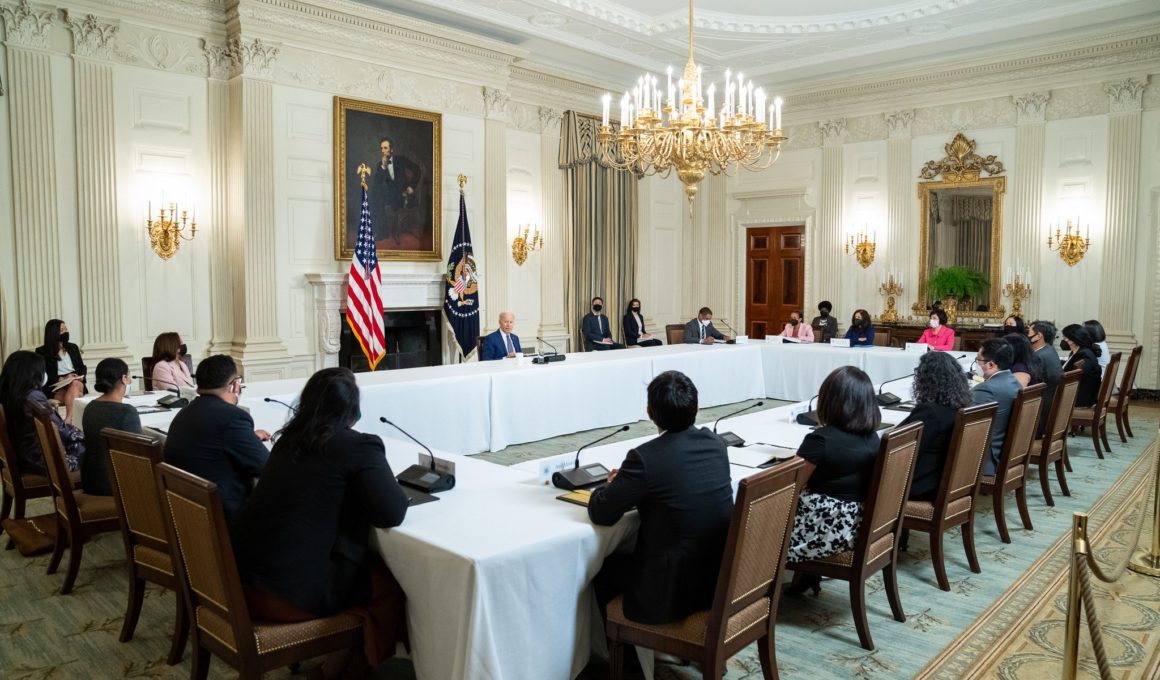Sign up here to receive The Yappie‘s weekly briefing on Asian American + Pacific Islander politics and support our work by making a donation.
After months of lobbying from advocates, President Joe Biden met with more than a dozen Asian American, Native Hawaiian, and Pacific Islander (AANHPI) civil rights leaders on Thursday, which marked the ninth anniversary of the 2012 Oak Creek massacre.
During the long-awaited sitdown, the president described the Aug. 5, 2012 shooting—when a white gunman entered a Sikh gurdwara in Wisconsin’s Oak Creek and killed six worshippers—as a “hateful act of bigotry.” The rampage was one of the deadliest days for the Sikh American community, which has faced xenophobic violence in the U.S. for over a century.
“Today, we honor everyone impacted by this tragedy, and we think about all the pain during this pandemic with the rise of hate crimes, harassment, bullying, and other forms of bias against Asian Americans,” Biden said.
The president’s remarks served as a somber backdrop for Thursday’s historic convening at the White House, which involved senior administration officials including Vice President Kamala Harris, White House AANHPI liaison Erika Moritsugu, and White House Initiative on AANHPIs executive director Krystal Ka’ai.
AAPI activists discussed the federal government’s response to the yearlong surge in anti-Asian attacks, but Axios’ Shawna Chen reports that the wide-ranging dialogue also included topics such as voting rights, immigration reform, messaging around the coronavirus, H-1B visas, and the need for disaggregated data.
Noting the alarming rise in discrimination against Asian Americans during the pandemic, the president recalled a “raw” conversation with AAPI advocates in Atlanta who felt unsafe and invisible.
“Our message back to you was, at that moment, ‘We see you. We see you,’” Biden said in prepared remarks delivered at the beginning of the meeting. “A few months later we stood here in the White House, and we signed the COVID-19 Hate Crimes Act into law. It [was] a powerful moment showing that we can come together, Democrat and Republican, and truly look out for one another.”
Reaction from AAPI advocacy groups was swift. Satjeet Kaur, executive director of the Sikh Coalition, highlighted the Oak Creek anniversary: “Being here today is a real testament of building community power. We are here today to talk about these issues, to build bridges and to really think about what are [the] policies that we can be putting forward to prevent and combat the violence.”
“One of the things we asked this White House is to really consider what they are putting out about the coronavirus and the messaging around it to ensure that our community is not going to get backlash,” said Sung Yeon Choimorrow, the head of the National Asian Pacific American Women's Forum. Choimorrow also thanked the Vice President Harris for her statement addressing the AANHPI community after the attacks in Atlanta.
Several leaders at the meeting represented organizations that focus on boosting AAPI voter turnout and family-based immigration, such as APIAVote and the Indian American Impact Fund.
“We discussed the importance of protecting the right to vote and how South Asian and Asian American communities—which turned out in record numbers in 2020—are now the target of voter suppression efforts,” noted Indian Impact Fund executive director Neil Makhija. “The president acknowledges that our communities are essential to the fabric of America, but our current laws undermine these values.”
Makhija further mentioned that advocates raised the Equal Access to Green Cards for Legal Employment (EAGLE) Act, as well as the America’s Children Act, which he said would be introduced in the Senate by Sen. Alex Padilla (D-California).
When asked by The Yappie whether decolonization, self-determination, or voting rights within the U.S. territories was discussed at the meeting, Empowering Pacific Islander Communities (EPIC) executive director Tavae Samuelu stated that it was not on the agenda, but added that EPIC is “definitely in strong… solidarity with those who would like for decolonization to happen. I always want to defer to those in the islands to make those determinations.”
Leaders from the Southeast Asia Resource Action Center, the Sikh American Legal Defense and Education Fund, the Asian Pacific American Labor Alliance, and Asian Americans Advancing Justice – AAJC were also in attendance on Thursday.
The meeting—which comes as the Biden administration pitches major initiatives on hate crimes, health care, and infrastructure to AAPI voters—is the third of its kind since the president took office. Biden and Harris previously hosted members of the Congressional Asian Pacific American Caucus in the Oval Office in April.









